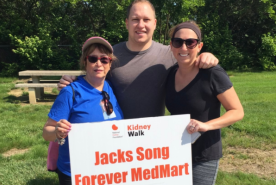How your access works
A hemodialysis access, or vascular access, is a way to reach the blood for hemodialysis. The access allows blood to travel through soft tubes to the dialysis machine where it is cleaned as it passes through a special filter, called a dialyzer. An access is placed by a minor surgery. As a hemodialysis patient, your access is one of the following:
- Fistula: an access made by joining an artery and vein in your arm.
- Graft: an access made by using a piece of soft tube to join an artery and vein in your arm.
- Catheter: a soft tube that is placed in a large vein, usually in your neck.
If your access is a fistula or graft, your nurse or technician will place two needles into the access at the beginning of each treatment. These needles are connected to soft tubes that go to the dialysis machine. Your blood goes to the machine through one of the tubes, gets cleaned in the dialyzer, and returns to you through the other tube. If your access is a catheter, it can be connected directly to the dialysis tubes without the use of needles.
A fistula should be considered the first choice for your access because it generally lasts longer and has fewer problems such as infections and clotting. However, some patients may not be able to receive a fistula because their blood vessels are not strong enough. A graft is considered the second choice for an access. Catheters are generally used as a temporary access, but sometimes they are permanent. Sometimes, it may be possible to switch to a fistula from another type of access. If you do not have a fistula, ask your dialysis care team if a switch would be possible for you.
Fistula or graft
- Wash with an antibacterial soap each day, and always before dialysis. Do not scratch your skin or pick the scab.
- Check for redness, a feeling of excess warmth, or the beginning of a pimple on any area of your access.
- Ask your dialysis care team to rotate the needles when you have your dialysis treatment.
Keeping your access working
Your dialysis care team will check your access often to make sure it is working well. An access that is not working well can decrease the amount of dialysis you receive. Your dialysis care team will teach you how to check your fistula or graft at home each day. Here are some tips you should follow to help keep a fistula or graft working longer:
- Check the blood flow several times each day by feeling for a vibration, also called a pulse or thrill. If you do not feel this, or if there is a change, call your doctor or your dialysis center.
- Do not wear tight clothes or jewelry on your access arm.
- Do not carry anything heavy or do anything that would put pressure on the access.
- Do not sleep with your head on the arm that has your access.
- Do not let anyone use a blood pressure cuff on your access arm.
- Do not let anyone draw blood from your access arm.
- Do not be afraid to ask your dialysis care team to rotate needle sites.
- Apply only gentle pressure to the access site after the needle is removed. Too much pressure will stop the flow of blood through the access.
- If you have breakthrough bleeding after you have dialysis, apply gentle pressure to the needle site with a clean towel or gauze pad. If the bleeding does not stop in 30 minutes, call your doctor or your dialysis center.
Check out our online communities to connect, learn more and hear from others going through similar experiences.
NKF Dialysis Community

Bionic Kidney "The Kidney Project" is nearing clinical trials....Let's all support this, it can change our lives
Hi Everyone, I have been a follower of the Kidney Project out of UCSF for the last 5-6 years. Dr Shuvo and his team are doing a fantastic job to bring this innovation to life. But as a non-profit they have only access to funds through fundraisers and donations. It pains me to say that this project is delayed going into the market by more than a y

How a Kidney Failure Diagnosis and Transplant Inspired a Future Doctor
After battling kidney failure and receiving a transplant, Andrew is determined to become a doctor and change lives. Read more: https://www.kidney.org/news-stories/how-kidney-failure-diagnosis-and-transplant-inspired-future-doctor

Long road
Yes I'm 36 and been on dialysis since u was 18 I live in Paducah Kentucky and it's been a rollercoaster of a ride. I started out young and. Didn't want to believe that lupus tooky kidneys away so I didn't got for a whole month during the summer months which was really bad I was so cold with the toxins in side of me I was wearing winter clothes when

advice
on my previous post i want to add that my partner is dizzy and breathless this is all happening so quickly does this sound like hes going to stage 5?

Anyone here on Peritoneal dialysis (PD) with Parkinson's (PD)?
Hi, I am 75 years old, have CKD and my nephrologist is recommending PD dialysis for me. I'm at the point where it's going to be needed in the future because my kidneys are getting worse but I don't need it right this minute. I also have Parkinson's and that along with carbidopa/levodopa type medication causes slow intestinal motility, constipation

LIVING WITH DIALYSIS-NEED ADVICE
As I stated in previous posts, my husband 74 has been on dialysis just over 1 year. In the last 2-3 months his legs have really gotten weaker. We first thought it was because of poor circulation, then he had an MRI of his lower back and they found a pinch nerve at L4=L5 plus spinal stenosis. but not bad enough for surgery. So we set up for him to g

We are survivors, don't lose heart brothers & sisters!
The best thing I can say to all of you is that I am still standing and doing well post 12 years on dialysis. This has not happened overnight but with some discipline and more imporatntly getting the right information at the right time. I have been penning down my experiences over the last decade so that folks here can learn about some important th

Today is World Kidney Day!
On #WorldKidneyDay, we take a moment to honor those we've lost, stand with those navigating their kidney disease journey, and recognize the caregivers who support them --- all across the country. Learn more about ways to support the kidney community: https://www.kidney.org/get-involved

hey, anyone tries herbs that can avoid dylasis,,?
taking herbs to avoid dylasis.

What to do during hemodialysis sessions?
What do people do during HD session? I try to sleep at least an hour, resulting in 2 or 3 more remaining hours. Is there anything I can do besides watching movies? I suppose I could bring books if I don't mind the weight.
If access problems occur
Sometimes, even when you are very careful, your access may clot or become infected. If an infection occurs, your doctor will order antibiotics for you. If your access develops a clot, you may need to go to the hospital for treatment. Removing the clot can usually be done on an outpatient basis, and you will not need to stay overnight.








